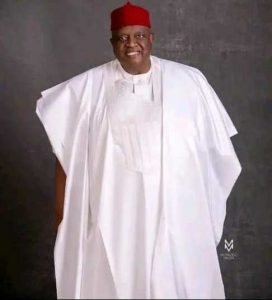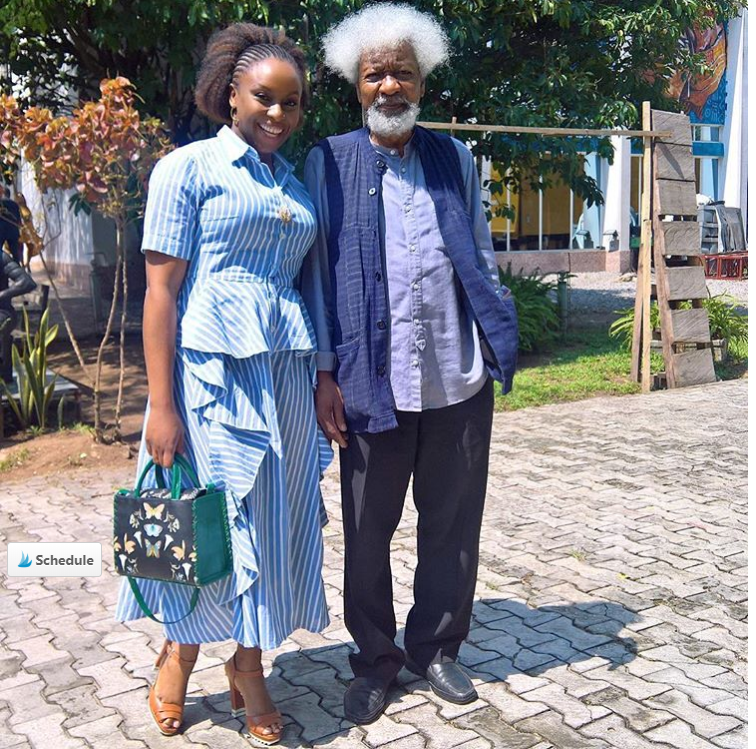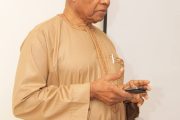By Adagbo Onoja
The conversation with Prof Chimalum Nwankwo was to have been no more than the fleeting ritual of two acquainted souls. How it graduated to an interview is the mystery about what is on offer here. The times are more than tight, even for a mature student. But the idea of hearing from an established literary critic on the recent cold exchange between two other established literary activists – Wole Soyinka and Chimamanda Adiche – was too fascinating not to create time for an interview on it. But what you have here goes beyond what a third big name has to say on two quarrelling big names in literature. The interview assumed its own course.

Prof Chimalum Nwankwo
In Intervention, we do not take any views as the right or wrong view. We take every standpoint as an articulatory performance whose meaning would ultimately depend on contending reading of it rather than the meaning or intention of the original speaker.
In case there is someone out there who does not know Prof Chimalum Nwankwo, he is the complex Nigerian critic who returned to Nigeria not long ago on the trigger of nationalism, has been in a few Nigerian universities but now on a writing holiday in the country. He was last seen on the premises of the Abuja based Veritas University whose Vice-Chancellor once said nobody could take Chimalum Nwankwo away from the university. But Prof Nwankwo worships at his own intellectual and cultural altars and might have found his current writing holiday more fulfilling for his type of mind than anything else at the moment. Savour him!
Two leading figures in the literary arena, all of them Nigerians – Wole Soyinka and Chimamanda Adiche – have recently been in a hostile conversation over the outcome of the February 2023 presidential poll. How do you, another Nigerian scholar of literature, read that conversation, from the point of view of literature and from the point of view of Nigerian politics?
In one of Soyinka’s books, I think it is The Interpreters, a character says “…metal on concrete jars my drink lobes… “! Forget the humour and stay with the pyrotechnics. That expression summons a universe that is physical, cultural and metaphysical. It is the kind of Soyinka tendency which provoked the war with the troika (Chinweizu, Onwuchekwa and Madubuike) who produced Toward the Decolonization of African Literature. At her best, Chimamanda Adichie would deliver something more precise and friendly in expressive terms. At her best, Adichie is the master of precision. Soyinka’s umbrella is vatic and invisible. Adichie’s umbrella, equally vatic, is more palpable and earthy. Perhaps such is the difference between the poet and the novelist. To appreciate my point better, re-visit Adichie’s Humboldt presentation, a virtuoso command and a gentle and suave appeal. Soyinka’s picture of the Labour Party and his comment harbor an eschatological germ that the masses would need a microscope to discern or identify. Revolutions and upheavals, unfortunately, are never nuanced. And so, the two writers stand on a parallax from which the same object is espied. And unfortunately, the Nigerian political conundrum earns its divergence from such parallel perspectives with the promontory of observers sitting on differing and oppositional irreconcilable interests.
The expectation is that the two operate at a level of abstraction to be able to have come to a consensus on the outcome of the presidential contest. Doesn’t the Soyinka and Adiche divergence point to even the men and women of knowledge failing to step back and stand above the fray and therefore a question mark on the ability of the knowledge industry to take Nigeria out of its quagmire?
Nigeria is not lacking in knowledge, not ever. The problem is that those who really know rarely have the opportunity to say or do what they know. Noise makers and loud-mouthed barons seize the day. Questionable celebrities and variegated kingmakers, jokers and jobbers with alien masters, and political ragamuffins from so-called illustrious backgrounds are fed into positions of eminence because of pedigree ascribed. Quite sad and unfortunate for a country overflowing with assorted endowments. Our problem as a nation has nothing to do with the likes of Soyinka and Adichie slugging it out in public spaces. Our problems come from the undeserving irrupting into such spaces and their being taken seriously when they do.

The debate that never was! Graphics: Courtesy of Nigeria’s ThisDay newspaper.
In the mid-1970s, those who would attack Soyinka the way he has been attacked now would not do so and the only reason they would not do so is they would have done some research and concluded that his past heroism on Biafra excuses his current standpoint, thereby making some of the reaction to the fascism charge a very poor statement on the epistemic preparation of the Facebook generation. That’s why I asked you if a crisis of a critical mass is not part of the problem.
That is not a problem at all. The problem is in Soyinka forgetting his own history and bracing himself with an African elder’s sense of responsibility and the concomitant circumspection demanded by such a role. Odumegwu Ojukwu lost that kind of sense too and paid some prize for it for a while before re-stabilizing. Among the Igbo, the Aro say that a true Aro son must learn how to grunt and pause while speaking or risk the grave danger of divulging sacred truths and secrets. The disconnect with the new generation is therefore not in the reactions of the new generation to Soyinka. Soyinka should say less so that his past could speak more. For instance, he combatively questioned the lampooning of Tinubu by the new generation of the Pirates Confraternity, a sad and lunatic irony considering the fact that he was one of the founders of that Confraternity. That conflict with the group is a disgrace on the same scale with the utterances about fascism and the Labour Party.
I was once compiling a list of those I thought could call Nigeria to order in explosive moments. I put Soyinka’s name and an editor removed it. When I asked, he said Soyinka doesn’t look at Nigeria. And now you are adding another analogy. Why does Soyinka attract such criticisms?
In the mid-1970s, Soyinka’s life and career rode on what in philosophical terms you may regard as a foundational consistency. Morally, politically, culturally, epistemologically and indeed pedagogically, he was generally gyrating (in Confraternity lingo!!!) to Barry White’s steady rhythmic percussion. The decibel stayed with “Teach what you Preach”! His life was a lesson for the dreamy radical questing for inspiration and the thoughtful humane Samaritan. The show was mighty credible and reliable. Undeniably, he was loved and revered by all and sundry, a bard whose interventions in politics and Literature were viewed with awe and wonder and a cultic thing to boot. But gradually, that season of glory began to evaporate, epical with the award of the Nobel Prize. But something started fraying and shaking after the Nobel Prize. Perhaps it was the drawn-out conflict with his detractors and the acerbic fire, the murk and mud flying from left and right. All that is a biographer’s task to decipher and correlate.. Those critics you mention knew a halcyon time as they know now too an uneasy doldrum. Before those questions, do not forget when during a conflict with Mrs Goodluck Jonathan, the woman called Soyinka “an empty professor”, making queasy news as when the proverbial improbable man bites a dog!. Perhaps it is his unguarded ripostes which come as in the Datti-Ahmed and Obi case with a certain disturbing partisan condescension far removed from his Confraternity’s admirable and measured decorous “no friend, no foe “. I really do not know. Perhaps….
One of the issues that came up in the last interview you had with Intervention is why it was possible for colonial warfare to have been so successful and complete in Africa. Have you reflected further on that?
African history in juxtaposition with other histories somewhat explains many things. Refer to China’s history and the Japanese presence in Manchuria and weigh the passion of occupiers against that of the oppressed. The pressure of resistance must trump the pressure of the incursion for the latter to be disorganized. Extend this comparison to the European powers efforts to be meaningful players inside China even with the distractions of the Opium wars. A reasonable ontological equilibrium, the Chinese forte, easily douses the country’s divisive primordial tensions and the internecine strife that would help any external enemies. The Chinese always “know themselves” despite a vastness of land and masses of peoples. Sturdy foundations nurture sturdy nationalisms and defensive polities. The problem of Africa with colonial forces was the problem of Native Americans with aggressive European colonial presence. Plunder and pillage are accompanied by covert agenda., and the more the unsuspecting innocence of the victims, the easier the enterprise. Never underestimate the twin apparatus of culture and commerce.

High profile personality, Chief Emmanuel Iwuanyanwu, assumes presidency of Ohanaeze
I asked that question in relation to the way the outcome of the presidential election is being discussed. Peter Obi was a clear case of a successful representational practice of power. Asiwaju Bola Tinubu was basically saying throughout that victory is what anybody makes of it. In all of that, one can see a take-over of Nigerian politics by a constructivist ontology. But in the disputation over the outcome of the election, nearly everyone, including the intellectuals, went back to facts and figures, rigging, INEC and so on without drawing on the implications of the observed trend for the country. Is it not risky that we are not theorising the trend?
Imagining that the African intelligentsia is deaf, dumb and blind is a huge mistake. Those you want to theorise are those you find watching for the opportune moment to skip over like lightning to the party they think are poised to win the next election. They will not theorise because next time around, they may have to be trapped with their own theory or theories. So many callous and shameless political shoppers roaming around with their eagle eyes pining away like forlon lovers and starving inebriates. The Marxian disease for primitive acquisition is strong and well. Your theorist for solution is the waiting seeker for room at the banquets of power. It is your constructivism of Peter Obi versus the capitalist monolith of crazed carpetbaggers,, brainless mammonists and Ali Baba and the Forty Thieves. The uninvolved stare in awe, amazed, frightened and disconsolate, intimidated; and indeed, afraid of being picked up for one badly cooked-up charge for one thing or the other.
Chief Emmanuel Iwuanyanwu has just emerged the President-General of Ohanaeze, a continuation of a tradition of throwing up strong national names for that position – John Nwodo, George Obiozor and now Iwuanyanwu. What is the message there?
By and large, my friend, beyond Iwuanyanwu and the impulse to pick such uncertain “mascots” , there are numerous idealists all over the place, frustrated and helpless, national passions flaring off into the barren wilderness of an orphan nation. Listen to General Obasanjo and Ishola Williams. Listen to Pa Adebanjo. Across ethnic divides is the agony of a captive nation chained by unnamable alien demons. In other words, the Ohanaeze anguish is not solitary. Ohanaeze has other names like Prof Tim Nwala wailing in the wilderness. On all sides too are conflicted national salvationists. But between that incurable allure of power and money and the hope and hunger for social justice which is killing the youth and the dream of a new morrow, something lurks…
Do you want to reminisce on your time with the university system since you returned to Nigeria?
I returned to Nigeria with very high hopes regarding what I could contribute intellectually but the university system is also replete with the same kind of things you find in public spaces. It is a game of gatekeeping and clique-sm and cronyisms and Government money-sharing. There was a time I was penciled out for a serious position in the public service. A friend of mine who heard about it called me and informed me quite hilariously that I should forget it. “Such positions”, he said, “are for settling party favours…” He was right. The opening fizzled out!




























